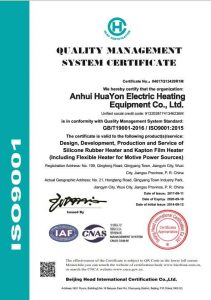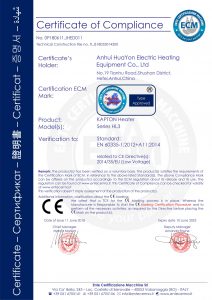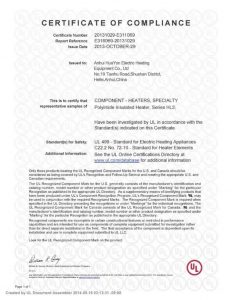Silicone Rubber Heater for Chemical Processing Quick Detail
Applicable Industries: medicine and healthcare, aerospace and aviation, Automotive industry, Consumer electronics
state: New
Type: electric heater
Birthplace:Anhui, China
brand name: HuaYon customize it
Dimension (L*W*H): personalized
Voltage: 3,7 ~ 480 V
1 one year warranty
Working temperature range: -30~200ºC
Material: Silicone rubber + engraved metal sheet
Thickness: 1,5-3 mm
Back adhesive: 3M 467/468 the personalized
Power density: 0,01-2,5 w/cm²
Power deviation: ±5%
Supply capacity: 50000 units per month
Packaging Details: inner PE bag + card
Certificates: THIS, RoHS, ISO9001
Silicone rubber heater is a type of thin film that heats up when electrified, in a standard thickness of 1.5 mm, Adopting nickel-chromium wires or nickel-chromium foils from 0.05 mm ~ 0.10 mm thick engraved in certain shapes, the heating component is wrapped with heat conductors and insulating materials on both sides, and completed in high temperature die forming and aging heat treatment.
Voltage | 3V-480V | Thickness | 1.5mm-3mm |
Power Density | 0.1-1.2W/CM2 | Insulation Ohm | More than 5MΩ |
Min Size | 10*10mm | Max Temperature | 250 degree |
Max Size | 2000*10000mm | Wire Tension | 15N*15N |
What is silicone rubber heater?
Freeze protection and condensation prevention for many types of instrumentation and equipment.
Medical equipment such as blood analyzers and test tube warmers.
Computer peripherals such as laser printers.
Curing of plastic laminates.
Photo Processing Equipment.
Semiconductor Processing Equipment.
Thermal transfer equipment
Drums and other containers and viscosity control and asphalt storage.
Key features and benefits of silicone rubber heaters include:
Flexibility: The flexibility of silicone rubber allows for molding, bend or mold these heaters to fit various shapes and surfaces. This feature makes them suitable for applications where rigid heaters are not practical..
Uniform heating: These heaters distribute heat evenly across their entire surface., mitigating the appearance of hot spots or cold regions and ensuring constant heating.
Quick response to heating: Silicone rubber heaters are known for their fast response times in reaching and adjusting temperatures., making them suitable for applications requiring rapid heating adjustments.
Durability: silicone rubber is resistant to various environmental factors, like humidity, chemicals and moderate physical wear, which improves the robustness of the heater.
Electrical isolation: The electrical insulating properties of silicone rubber ensure safe use in applications where electrical insulation is vital.
Customizable layout: Manufacturers can customize silicone rubber heaters in terms of size, form, power and temperature distribution to meet specific heating requirements.
Silicone rubber heaters are used in a wide spectrum of industries and applications, including:
Industrial processes: Heat tanks, pipelines, valves and manufacturing equipment, and assist in curing operations, drying and preheating.
Medical devices: They are used in medical equipment as IV bag warmers, heated patient warmers and medical imaging tables.
Aerospace and aviation: preventing ice buildup on aircraft components by deicing critical areas such as wings.
Food and beverage industry: maintenance of specific temperatures in food processing equipment, such as boilers and tanks, during production processes.
electronics: Integration in electronic cabinets, display panels and other devices for temperature regulation.
Automotive section: Used in seat heating applications, defrosting windows and preheating engines in vehicles.
A silicone rubber heater for chemical processing is a type of flexible heater used to maintain or raise temperatures in various industrial applications., particularly where precise temperature control is essential. Below are some key aspects of silicone rubber heaters and their use in chemical processing:
Características de los calentadores de caucho de silicona
Flexibles y duraderos: fabricados con un material de caucho de silicona flexible, estos calentadores pueden adaptarse a la forma del equipo que calientan. El material de silicona es resistente a la humedad, los productos químicos y las altas temperaturas, lo que lo hace muy duradero en entornos hostiles.
Uniform heating: Los calentadores de caucho de silicona brindan una distribución uniforme del calor en toda su superficie, lo cual es esencial para el mantenimiento constante de la temperatura en aplicaciones de procesamiento químico.
Customizable: Estos calentadores se pueden diseñar a medida para adaptarse a equipos y aplicaciones específicos, incluidas varias formas, tamaños y densidades de vatios. También pueden incluir funciones como termostatos integrados, termopares o RTD (detectores de temperatura de resistencia) para un control preciso de la temperatura.
Calefacción eficiente: ofrecen una transferencia de calor eficiente y pueden alcanzar rápidamente la temperatura deseada, lo cual es importante para procesos que requieren ciclos rápidos de calentamiento y enfriamiento.
Aplicaciones en procesamiento químico
Tanques y recipientes: los calentadores de caucho de silicona se usan comúnmente para calentar tanques y recipientes que almacenan o procesan productos químicos. Mantener la temperatura correcta es crucial para las reacciones, la disolución o la prevención de la cristalización.
Tuberías y tubos: se pueden envolver alrededor de tuberías y tubos para evitar la congelación, mantener la viscosidad del fluido o garantizar que se produzcan reacciones químicas a la temperatura deseada.
Calefacción de equipos: en las plantas de procesamiento de productos químicos, es posible que sea necesario calentar varios equipos, como bombas, válvulas y reactores, para que funcionen correctamente o mantengan la eficiencia del proceso.
Uso en laboratorio: en laboratorios químicos, Silicone rubber heaters can be used to heat samples, flasks or other laboratory apparatus to ensure accurate experimental conditions.
Benefits
Chemical resistance: Silicone material is resistant to many chemicals, making these heaters suitable for environments where they may be exposed to corrosive substances.
Security: Silicone rubber heaters are designed to operate safely in hazardous environments. Se pueden fabricar para cumplir con diversas normas de seguridad, incluidas las de áreas a prueba de explosiones.
Temperature control: Con sensores de temperatura integrados, estos calentadores brindan un control de temperatura preciso y confiable, lo cual es esencial para mantener la integridad del proceso.
Instalación y mantenimiento
Easy installation: Los calentadores de caucho de silicona suelen ser fáciles de instalar debido a su flexibilidad y se pueden asegurar con adhesivos, correas o sujetadores mecánicos.
Bajo mantenimiento: Una vez instalados, requieren un mantenimiento mínimo, lo que contribuye a su rentabilidad en el tiempo.
In summary, los calentadores de caucho de silicona son soluciones versátiles, confiables y eficientes para mantener y controlar las temperaturas en aplicaciones de procesamiento químico. Su capacidad para soportar condiciones duras y proporcionar un calentamiento uniforme los hace ideales para garantizar operaciones de procesamiento químico consistentes y seguras.
![]()
![]()





Reviews
There are no reviews yet.